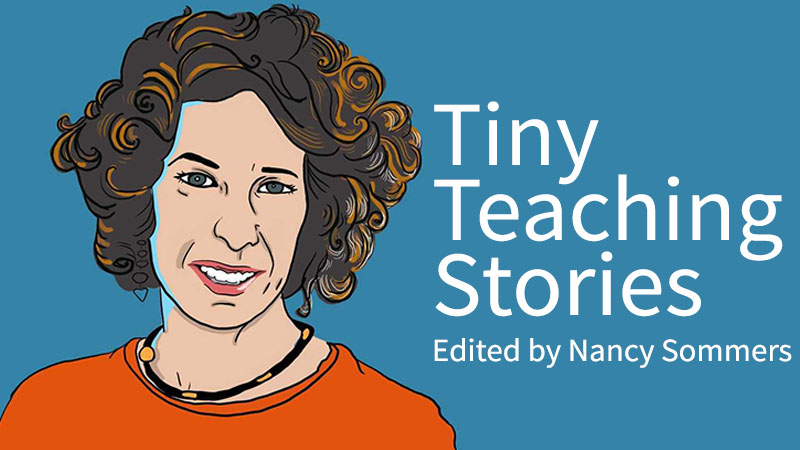-
About
Our Story
back- Our Mission
- Our Leadershio
- Accessibility
- Careers
- Diversity, Equity, Inclusion
- Learning Science
- Sustainability
Our Solutions
back
-
Community
Community
back- Newsroom
- Webinars on Demand
- Digital Community
- The Institute at Macmillan Learning
- English Community
- Psychology Community
- History Community
- Communication Community
- College Success Community
- Economics Community
- Institutional Solutions Community
- Nutrition Community
- Lab Solutions Community
- STEM Community
- Newsroom
- Macmillan Community
- :
- English Community
- :
- Bits Blog
- :
- Bits Blog - Page 2
Bits Blog - Page 2
Options
- Mark all as New
- Mark all as Read
- Float this item to the top
- Subscribe
- Bookmark
- Subscribe to RSS Feed
Bits Blog - Page 2
Showing articles with label Corequisite Composition.
Show all articles
Author
07-29-2022
07:00 AM
Today's Tiny Teaching Story is by Dr. Meridith Leo. Leo teaches courses in Composition and Rhetoric as well as Creative Non-Fiction at Suffolk County Community College’s Ammerman Campus. Dr. Leo earned her Ph.D. at St. John’s University where she focused on narratives of difference and belonging along with culturally responsive literacy narratives. Her research at St. John’s University led to work in Co-Requisite (ALP) coursework which is detailed in her dissertation “Integrating Emerging Writers into the Post-Remedial College: A Consideration of Accelerated Learning Programs.” No Sleep, Only Teach Ding. It's 3 am. I should be sleeping but I'm not. That's the 3rd email from Katia. Ding. There goes another email. It's Jeremiah this time. Do I get up? The emails will just keep coming; they're awake. I guess it's time to start the day. Computer on. Login complete. Virtual meeting links sent. Black tiles slowly fade to Katia and Jeremiah. "Good morning. What's going on?" My voice is cracking as it wakes. Simultaneously I hear: "We need help with our essays!" Through a yawn, I manage to say, "Okay let's see what we can work through. Don't worry. We'll figure it out." Submit your own Tiny Teaching Story to tinyteachingstories@macmillan.com! See the Tiny Teaching Stories Launch for submission details and guidelines.
... View more
Labels
-
Composition
-
Corequisite Composition
-
Developmental English
-
Literature
0
2
2,044
Author
07-08-2022
07:00 AM
Today's Tiny Teaching Story is by Carmen Misé, Assistant Professor of English and Communications at Miami Dade College - North Campus. Misé is an insatiable reader and greatly enjoys film. Her favorite genre is horror (mystery, suspense, thrillers, sci-fi). She writes non-fiction and poetry, enjoys being outdoors and spending time with family, friends, and her dog Hamlet. Misé just became a first-time mom. She believes in aliens, and yes, the Earth is round. Hello! As I logged into Blackboard Collaborate Ultra, using the recommended browser, and triple checking my Internet connection, I instantly dreaded the sea of silence in our “classroom.” The silhouettes of “users.” No faces, no voices. I felt like that one time I shouted, “Hello!,” as I stood at the Grand Canyon's South Rim. My salutation echoed through time and space, but I did not know its end destination or if anyone heard me. That day would be different. We laughed and talked about our favorite local restaurants. I met everyone's cat. We didn't cover thesis statements, but I was OK with that. Submit your own Tiny Teaching Story to tinyteachingstories@macmillan.com! See the Tiny Teaching Stories Launch for submission details and guidelines.
... View more
Labels
-
Composition
-
Corequisite Composition
-
Developmental English
-
Literature
2
3
2,580
Author
06-17-2022
07:00 AM
Today's Tiny Teaching Story is by Dr. Nancy E. Wilson, Associate Professor and Directory of Lower Division Studies at Texas State University. Epiphanies Asked to share an epiphany, Misha mentions that while watching a YouTube video of a KKK grand wizard, she recognized that they had something in common: as an African American, she also wishes to preserve her racial heritage. When the class expresses alarm, Misha clarifies that she knows about the KKK’s hatred of African Americans; however, during quarantine she resolved to stop condemning and canceling others. Doing so made her feel superior but left her ignorant. She suggested that as a class we “run toward” uncomfortable topics and try to understand why people think what they think. Every class needs a Misha. Submit your own Tiny Teaching Story to tinyteachingstories@macmillan.com! See the Tiny Teaching Stories Launch for submission details and guidelines.
... View more
Labels
-
Composition
-
Corequisite Composition
-
Developmental English
-
Literature
1
2
2,096
Author
05-27-2022
07:00 AM
Today's Tiny Teaching Story is by Jenna Morton-Aiken, Assistant Professor at the Massachusetts Maritime Academy. Voices Day 1: Welcome to Technical Writing. I cultivate tone and words to establish authority with young, mostly male, maritime cadets. Call me Dr. Their body language shouts, Stop trying, your class doesn’t matter to me. Weeks 1-3: Deploy resistance with strong voice and applied expertise as Covid-19’s shadow grows. Maybe this doesn’t suck, white gaps between double-spaced submissions whisper. Week 4: Campus abandoned, we’re all silenced. Week 5+: I’m here, I write with memes and raw emotions, my voice virtually transformed. Theirs, too—Help me, they say. I’m drowning, they say. Your words matter to me, they say. We write. Submit your own Tiny Teaching Story to tinyteachingstories@macmillan.com! See the Tiny Teaching Stories Launch for submission details and guidelines.
... View more
Labels
-
Composition
-
Corequisite Composition
-
Developmental English
-
Literature
1
1
2,057
Author
05-06-2022
07:00 AM
Today's Tiny Teaching Story is by Dr. Chris M. Anson. Chris is a Distinguished University Professor at North Carolina State University, where he is also the Director of the Campus Writing & Speaking Program. Boot Camps and Boot Straps Four years after I taught him in a federally-funded pre-college summer program for inner-city kids who some high school teacher saw a spark in—otherwise doomed never to go to college—we crossed paths on the campus just before graduation. "Cool Chris!" he yelled—the name the students had given me in that summer writing course. "Tyrone! What's up?" We high-fived. "I got into Harvard Law!" he said with a broad smile, "and you helped, man!" A story of triumph—his, and my small piece of it. But what's wrong with us that so many live on the margins . . . and of those, with such slim chances? Submit your own Tiny Teaching Story to tinyteachingstories@macmillan.com! See the Tiny Teaching Stories Launch for submission details and guidelines.
... View more
Labels
-
Composition
-
Corequisite Composition
-
Developmental English
-
Literature
1
0
1,132
Author
04-15-2022
07:00 AM
Today's Tiny Teaching Story is by Jennifer Gray, Professor of English and Director of the Writing Center at the College of Coastal Georgia. Video Conference The student requested a video conference on Easter Sunday at 4pm. I said yes, because it was what he selected. I grumbled privately, as it was the only day without something work-related scheduled. I left celebrations at my neighbor’s house, much to our dismay, and logged in, expecting a blank black box. Instead, there he was, with a smile, a Zoom wave, and his Walmart uniform and nametag, calling from the front seat of his car on his break during his shift on a holiday. We talked about our assignment. He revised his citing practices, and I revised my negativities. Submit your own Tiny Teaching Story to tinyteachingstories@macmillan.com! See the Tiny Teaching Stories Launch for submission details and guidelines.
... View more
Labels
-
Composition
-
Corequisite Composition
-
Developmental English
-
Literature
2
0
1,067
Author
04-01-2022
07:00 AM
Today's Tiny Teaching Story is by Lisa Lebduska, Professor of English and Director of College Writing at Wheaton College. Observations As a grad student adjuncting at 3 schools, I always ran late. One rainy day, I flew into my office, changed into dry shoes, then rushed to class. When class ended, a student was waiting for me. "We just wanted you to know," she said, "that we noticed you are wearing two different shoes." I looked with horror from the beige wedge on my left, to the black pump on my right. "Why didn't anyone say anything?" "We thought it was another one of those exercises where you were trying to see if we were paying attention to details… We were." Submit your own Tiny Teaching Story to tinyteachingstories@macmillan.com! See the Tiny Teaching Stories Launch for submission details and guidelines.
... View more
Labels
-
Composition
-
Corequisite Composition
-
Developmental English
-
Literature
2
0
1,002
Author
03-18-2022
07:00 AM
Today's Tiny Teaching Story is by Sonia Feder-Lewis, a Professor at Saint Mary's University of Minnesota's Graduate School of Education. Awakening It was a dream course assignment: a small upper-level honors class in Women’s Literature. A reward near the end of graduate school. Eleven students: 10 women and one brave young man, newly separated from the Army for carefully undisclosed reasons. The women treated him gently as we read Woolf, Morrison, Erdrich, Chopin. “The Awakening is the greatest book I have ever read,” he said passionately. Two decades later, he recognizes me in a coffee shop. Without pause, he tells me the course had been his favorite. And his hardest. I do not ask why. Submit your own Tiny Teaching Story to tinyteachingstories@macmillan.com! See the Tiny Teaching Stories Launch for submission details and guidelines.
... View more
Labels
-
Composition
-
Corequisite Composition
-
Developmental English
-
Literature
1
0
1,261
Author
02-18-2022
07:00 AM
Today's Tiny Teaching Story is by Pamela Childers, a lifelong secondary, undergraduate and graduate school educator, writer, editor, and consultant. She enjoys collaborating with colleagues and students. Student Teaching “Go wash your mouth out with soap!” And he did. The 8th grader returned to our grammar lesson in progress, raised his hand, and bubbled out the next answer. In Biology class, I distributed apples and asked, “Who can identify the internal parts you just dissected?” And they all did, delighted to eat their half apples. Rushing to my senior English class to discuss the Romantic poets, I passed a student at his open locker pulling out a knife. “May I have that, please?” And he handed it to me. Things were much different in 1965, I have learned. Submit your own Tiny Teaching Story to tinyteachingstories@macmillan.com! See the Tiny Teaching Stories Launch for submission details and guidelines.
... View more
Labels
-
Composition
-
Corequisite Composition
-
Developmental English
-
Literature
1
0
1,178
Author
01-14-2022
07:00 AM
Today's Tiny Teaching Story is by Michelle Graber, Instructor of English and Communications at Mitchell Technical College. Superheroes Students sit six feet apart – eyes beaming up at me expectantly, masks askew. I’ve never noticed so many of my students’ eyes: shades of blue, brown, green, and hazel. I wonder what the rest of their faces look like, this sea of superheroes tolerating the mandated masking of their identities for the sake of public approval. Wow. I’m teaching superheroes. I face the class during the pandemic peak and push them through their studies. One student raises his hand to ask a question, and I find myself contemplating Charlie Brown’s problems understanding his teacher. She must’ve been wearing a mask, too. “A little louder, please,” I say, trying to resist leaning forward to hear better as I meet the grass-green orbs of the student whose name I can’t associate with a face and whose words I cannot hear. Submit your own Tiny Teaching Story to tinyteachingstories@macmillan.com! See the Tiny Teaching Stories Launch for submission details and guidelines.
... View more
Labels
-
Composition
-
Corequisite Composition
-
Developmental English
-
Literature
3
0
1,316
Author
12-17-2021
07:00 AM
Today's Tiny Teaching Story is by Stuart Barbier, a Professor of English at Delta College. Pension “Your Internet connection is unstable,” warned my computer during yet another Zoom. That’s not the only thing that’s unstable, I thought, unable to separate non-work life (gardening and PBS period dramas) from work life (freshman composition and workplace drama). Face-to-face, I taught all students at the same time, answering questions within the class well enough that students rarely contacted me otherwise. Online? Endless emails, texts, phone calls, and videos, assignments trickling in like water torture, twenty-four/seven, as I turn my computer on when I get up and off when I go to bed. Retire, a friend suggested. Alas, too young. Submit your own Tiny Teaching Story to tinyteachingstories@macmillan.com! See the Tiny Teaching Stories Launch for submission details and guidelines.
... View more
Labels
-
Composition
-
Corequisite Composition
-
Developmental English
-
Literature
3
0
1,116
Author
11-19-2021
07:00 AM
Today's Tiny Teaching Story is by Heidi Rosenberg, a Senior Lecturer at the University of Wisconsin-Madison's Wisconsin Business School. Teaching in the Time of COVID Shana says she’s all right. How can I help? Each student is a square within a square I hold. She nearly pulled her finger off—it got caught so typing is one-fingered. She moved to her own place. She was pregnant, then not. The father of the never-born-baby smacks. I email, it’s her birthday—“happy birthday.” I am the only one who said that. Her family—This is why I moved out. I say, You didn’t move far enough. She has a scholarship, job, apartment. We come to terms. One thing she asks: how do I stay when there’s nothing? Submit your own Tiny Teaching Story to tinyteachingstories@macmillan.com! See the Tiny Teaching Stories Launch for submission details and guidelines.
... View more
Labels
-
Composition
-
Corequisite Composition
-
Developmental English
-
Literature
3
0
1,528
Author
10-29-2021
07:00 AM
Today's Tiny Teaching Story is by Patrick Morgan, Assistant Professor of English and Director of First-Year and Professional Writing at the University of Louisiana Monroe. Tragedy to Hope It was my first semester teaching in the Deep South. Introducing a narrative unit to twenty-four freshman writers, I shared that apocryphal story about Ernest Hemingway betting a bunch of writers that he could compose a six-word short story: “For sale: baby shoes, never worn.” I asked them to unpack the story. Twenty-three students offered the usual tragedies: variations on infant mortality and infertility. One shy student said, “Maybe the author is a shoemaker.” And just like that, tragedy turned to hope. This was the story of an enterprising cobbler carving out the market for new shoes. Submit your own Tiny Teaching Story to tinyteachingstories@macmillan.com! See the Tiny Teaching Stories Launch for submission details and guidelines.
... View more
Labels
-
Composition
-
Corequisite Composition
-
Developmental English
-
Literature
4
1
1,785
Author
10-05-2021
10:00 AM
We know from our own experience, and from mountains of research (see Iowa State’s Center for Excellence in Learning and Teaching to get a sense of what’s out there), that students need to feel like they belong in our classrooms if they are going to succeed. We foster this sense of belonging in everything we do: from the way we greet students on their first day in class to the way say goodbye on their final day. For me, though, course design is the first area of focus that comes to mind when I think about how to ensure students feel they are an integral part of the class. We can help our students feel at home even before they arrive in our classrooms by carefully planning the fifteen weeks we will share with them so that our time spent together is equitable, clear, relevant, and reflective. The Course Design Equity and Inclusion Rubric available at Stanford’s Teaching Commons offers a helpful way to evaluate one’s own course content. The rubric features categories such as “Personal Connections and Relevance,” “Transparency of Content,” “Diversity of Perspectives” and “Diversity of Media” that will remind instructors—especially those of us who have been around a while—to take a fresh look at not only what material we are assigning but how we expect students to respond to it. The pandemic has reminded us how reliant we have become on technology to enable learning, but also how tentative our connections to that technology sometimes are. It’s vital, therefore, that while we take advantage of the learning resources that are at hand, we make no easy assumptions about students’ access to or competence in the technosphere. As Clint Smith points out in his 2019 Atlantic article “Elite Colleges Constantly Tell Low-Income Students That They Do Not Belong,” it is wrong to treat all students “as homogeneous…, as if they all navigate these schools in the same way.” Naturally, our course homepage and syllabus should be easy to read and easy to navigate. We not only model clear writing for our students in these documents, but we also ensure that our expectations and theirs are in concert. And it is here that we demonstrate—by assigning diverse authors and content-creators in varied genres—that we honor a range of ways of expressing ideas and opinions. Of course, students cannot succeed unless their basic needs are met. Even the most dedicated student will necessarily prioritize shelter and food over a problem-solution essay. Our awareness of our campus’s full resources, and our ability to guide students directly to the resources they need, is a clear sign that we believe all students belong in our classes. Instructors in every discipline take for granted the importance of their own field of study, but those of us in English probably feel that the importance of our subject is self-evident. It’s obvious to us that success in college will depend, to a large extent, on one’s ability to communicate clearly and persuasively. However, our discipline’s relevance may not be immediately apparent to a student planning to study Chemistry or Computer Science, and we need early and often to connect the value of effective written and spoken communication to success across the curriculum. In a study of college students from nonmajor sections of biology, psychology, and English, researchers found that students feel an increased sense of belonging to the course in which they are enrolled when they perceive that “academic tasks are interesting, important, and useful” (Freeman et al 205). Finally, we must plan time throughout the semester for students’ self-reflection. In my experience, these meta-conversations about college that students may initially feel are off-topic, may wind up being as important as any discussion of course content. Maithreyi Gopalan and Shannon Brady recommend creating an environment “that helps students feel connected to each other, to faculty and staff, and to the institution.” Among their suggestions for fostering this sense of belonging is foregrounding the idea that “certain kinds of challenges in the transition to college…are common, shared by many students from diverse backgrounds, and likely to abate over time. Such thoughtful outreach seems to be especially powerful for Black, Latinx, Native, and first-generation students.” Granted, Day One of any class is a crucial one, but “Day Zero”—the planning that takes place before the course even starts—is just as important.
... View more
Labels
-
Corequisite Composition
2
0
1,492
Author
09-30-2021
07:00 AM
Tiny Teaching Stories: Launch Share Your Inspirational, Motivational or Funny Teaching Anecdotes With Us!
Hello! I am excited to announce the launch of a new series on Bedford Bits: Tiny Teaching Stories, and to invite your participation.
What are Tiny Teaching Stories, you ask? See our introductory video or view our hub here:
To get us started, I'd like to share my own Tiny Teaching Story with you.
We were small zoom squares, remote, distant, across 4 continents. In our online writing class, I talked about the need to create a classroom community; they filled the chatbox talk with fears about the pandemic, who had died, and who was in the hospital. Isabelle, in Vietnam, sprawled on her pink ruffled bedspread; Zara, in Pakistan, turned off her video to leave class for morning prayers. We understood that we would never see each other in person; we would always be at a distance, always in gallery view. And yet, when I missed class on the day my mother died, from across 4 continents they sent me poems of consolation and a bouquet of sunflowers.
Now, we want to hear from you. Send us your Tiny Teaching Story!
Submit your Tiny Teaching Story to tinyteachingstories@macmillan.com.
Guidelines for submission:
Stories should be no more than 100 words.
Include with your submission the attached release form.
Tiny Teaching Stories can be published anonymously or with attribution; please indicate your preference in your submission and include a brief one to two-sentence biography for non-anonymous publication. If you would like to, we encourage you to also submit your social media handles and a headshot (optional).
Please change identifying names and details of students to protect their privacy.
... View more
Labels
-
Composition
-
Corequisite Composition
-
Developmental English
-
Literature
4
0
13.9K
Topics
-
Bedford New Scholars
42 -
Composition
238 -
Corequisite Composition
33 -
Developmental English
31 -
Events and Conferences
18 -
Instructor Resources
6 -
Literature
40 -
Professional Resources
7 -
Virtual Learning Resources
4
Popular Posts








